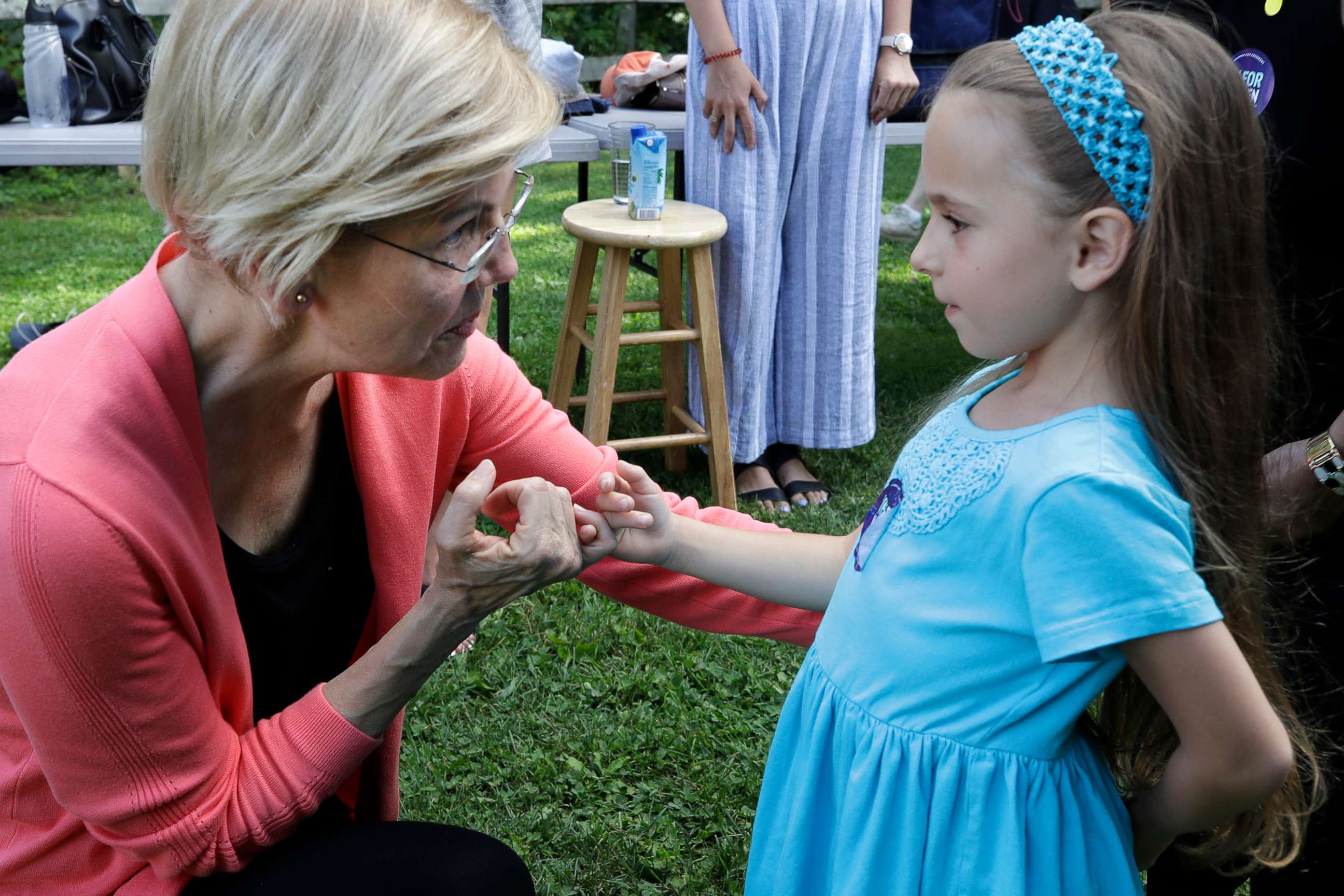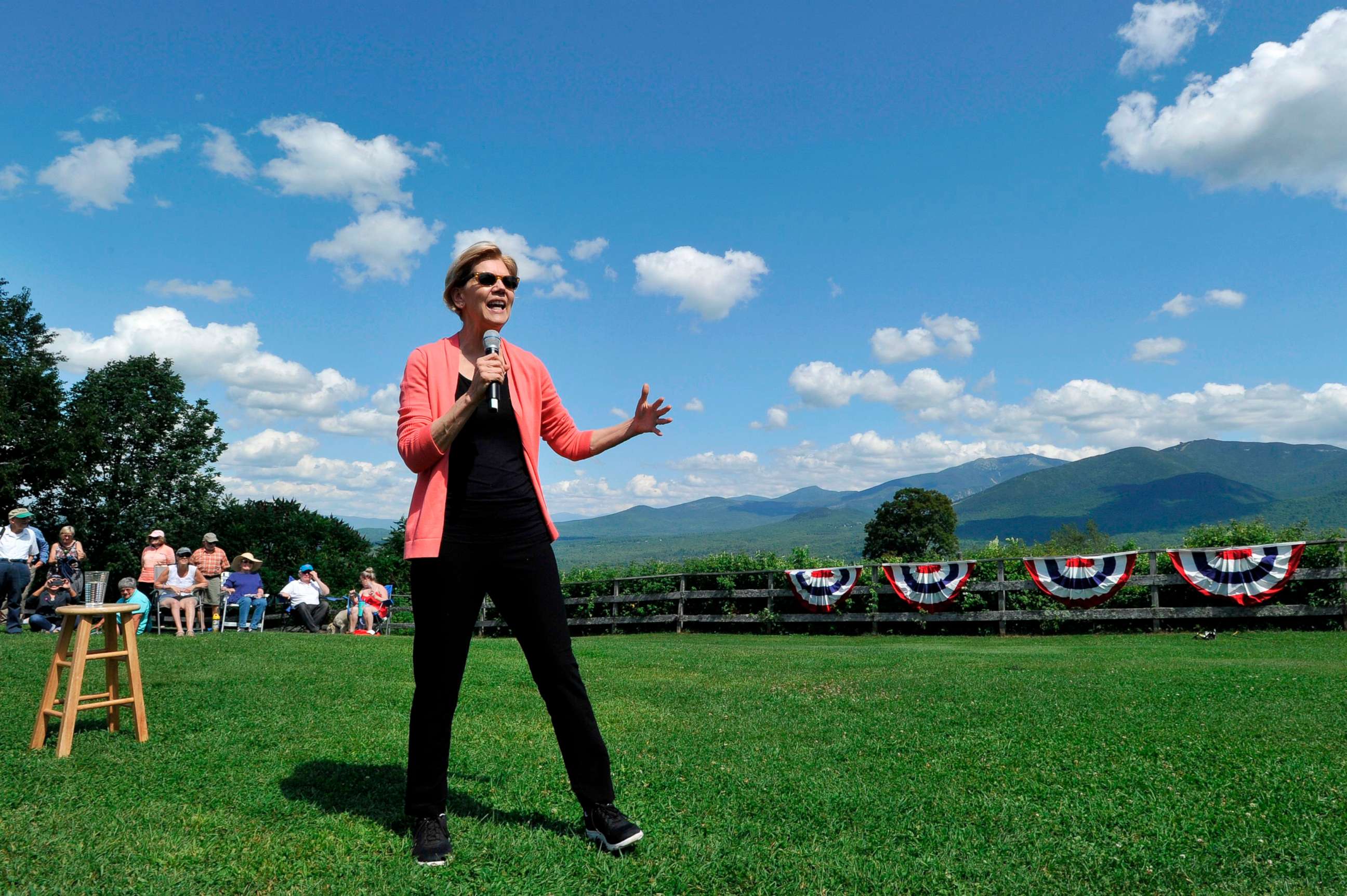Sen. Elizabeth Warren at Native American forum: 'I am sorry for harm I have caused'
Warren previously came under fire for claims of Native American ancestry.
Presidential candidate Sen. Elizabeth Warren has repeatedly addressed the most well-known cloud over her campaign -- the senator's controversial claims of Native American heritage and her subsequent DNA test -- in two ways: with an apology and a determination to move forward as a partner to tribes.
But on Monday, Warren took her apology straight to the Native American voters she will have to win over in the 2020 election.
"Now, before I go any further in this I want to say this. Like anyone who's been honest with themselves, I know that I have made mistakes," Warren said, speaking before a predominantly Native American audience at the first-ever Frank LaMere Native American Presidential Forum in Sioux City, Iowa. "I am sorry for harm I have caused. I have listened and I have learned a lot. And I am grateful for the many conversations that we have had together."
Warren has long maintained that she grew up hearing that her mother’s family was part Native American, a claim that has often besieged her political career and fueled one of President Donald Trump's most-repeated insults on the trail: referring to the senator as "Pocahontas."
Trump has used the nickname, which Warren and others have called a racial slur, 18 times on Twitter since 2016, and countless times at rallies, including Thursday night in New Hampshire.
The DNA test Warren took earlier this year, which was poorly received by tribes and which she later apologized to the Cherokee Nation for, showed Native ancestry "likely in the range of 6-10 generations ago" but does not, as Warren has noted, give her any claim to tribal citizenship.
On Monday, Warren followed her apology with an explanation of her latest plan -- a proposal to address urgent issues in the Native American community, which came out just before her appearance at the Native American presidential forum. A handful of other presidential candidates also spoke at the forum.
Chairman Aaron Payment of the Sault Ste. Marie of Chippewa Indians, a panelist at the forum who said he's known Warren for years, encouraged her on stage to share her heritage, but to avoid getting in the mud with President Donald Trump.
"When [Trump] goes low, you go high ... tell us what you're going to do for us," he said on stage.
She earned cheers at Monday's forum for saying she'd revoke pipeline permits and honor treaty obligations. She also garnered a loud applause for her pitch about implementing a 2% wealth tax on those with fortunes over $50 million.
OJ Semans, a member of the Rosebud Sioux Tribe and an organizer of the forum, applauded Warren's proposals, as well as a plan on indigenous issues put out by 2020 candidate Julian Castro, for addressing what he called "common sense issues" Native Americans face that most people across the country aren't aware of.
"I think if they were, they wouldn’t tolerate it," Semans said. He looked to the forum as a chance to get those struggles in front of the next potential president, potential Cabinet members and, broadly, the American people. He did not expect moderators or audience members to have questions for Warren on the DNA test, he said.
"It doesn't do us any good to have a U.S. senator or future president get up there and talk for 45 minutes about DNA. How does that help us with with, you know, our high suicide rate? How does that help us with the Keystone XL pipeline? How does that help us with our missing and murdered Indigenous women and children? It makes no sense to me," Semans said in an interview with ABC News.
"I know, there's a lot of people out there thinking about it. But when you have people dying, that's trivial. I mean, we deal with life and death," Semans said, growing serious to discuss the issues his organization is placing front and center at the forum, including funding for health care on reservations that he said amounts to less than what federal prison inmates receive.
What Warren proposed in her plan to address Native American issues
The plan Warren rolled out ahead of the forum both charted a way forward for Native American communities and gave Warren a platform to demonstrate her understanding of issues that she’s been criticized for disrespecting by claiming Native American ancestry.
"We must ensure that America’s sacred trust and treaty obligations are the law of the land -- binding legal and moral principles that are not merely slogans, but instead reinforce the solemn nation-to-nation relationships with Tribal Nations," Warren wrote in the plan. As in each of her plans so far, the senator from Massachusetts invoked her trademark message: "Accomplishing this will require structural change."
"The story of America’s mistreatment of American Indians, Alaska Natives, and Native Hawaiians is a long and painful one, rooted in centuries of discrimination, neglect, greed, and violence. Tribal Nations robbed of more than a billion acres of land. Resources seized and sacred sites desecrated. Native languages and religions suppressed. Children literally stolen from communities in an effort to eradicate entire cultures," Warren wrote. "Native history is American history -- and we must be honest about our government’s responsibility in perpetuating these injustices for centuries."
Warren also acknowledged, however, that she doesn't expect roughly 19 pages of policy to fix everything.
"This legislation will not address every major policy issue of concern to Tribal Nations and indigenous communities. But it will represent an urgently needed and long-overdue step toward ensuring that the United States finally, and for the first time, fully meets its resource obligations to Indian Country," she wrote.

Among the key points addressed in the plan, Warren called for criminal justice reform on tribal lands. She cited current law that prohibits tribes from prosecuting non-natives when the crime is committed on sovereign land.
"Consider just one example. In 2003, a 19-year-old Native woman reported a rape by an Army recruiter. Because the recruiter was not a citizen of a tribe, tribal authorities could not prosecute him," Warren wrote in the plan. "There are countless heartbreaking stories like these. 96% of Native female sexual assault victims have experienced violence at the hands of a non-Native person."
In addressing this issue -- and specifically the crisis of missing and murdered Native American women -- Warren proposed a Department of Justice task force "to investigate the epidemic of sexual assaults and murders committed against Native women and prosecute offenders." She would also create a system similar to Amber Alerts, which send widespread messages when children go missing, specifically for Native American women, according to the plan.
"America faces an epidemic of missing and murdered indigenous women. This crisis affects Native women and girls everywhere -- on reservations, in cities, and in rural communities," Warren wrote, citing statistics from the National Crime Information Center that 5,712 indigenous women and girls were reported missing in 2016 and that 84% of indigenous women have experienced violence in their lifetime.
"This is a moral failing and a stain on our country," Warren wrote.
Warren also proposed marijuana legalization on tribal lands, which she cited as part of building up financial infrastructure.
The senator acknowledged that not every tribe is interested in "the economic opportunities associated with changing laws around marijuana," but said "a number of Tribal Nations view cannabis as an important opportunity for economic development."

On the issues of physical infrastructure investments, Warren calls for tripled funding for the Department of Energy’s Office of Indian Energy and significant "set-asides" for improving water tribal drinking water.
More than 25% of rural Native Americans have "experienced electricity problems at their residences," Warren’s policy plan noted, while nearly 40% of homes in the Navajo Nation "do not have access to running water."
The policy is paired with legislation Warren is introducing in Congress alongside Democratic New Mexico Rep. Deb Haaland, one of the first Native American women to be elected to Congress and a Warren ally. Haaland, who endorsed Warren early in the race, will also introduce her at the forum in Iowa on Monday.
The legislation, called the Honoring Promises to Native Nations Act, will not head to the floor until after a "public consultation period" where tribal governments, citizens, experts and the entire public can offer "input and suggestions," Warren wrote in the policy plan.
To Semans, that one line in the plan marked the most important part: representation.
"In actually talking to the people that the legislation will affect, to me, that was the strongest part of the deal. Because if you look at that, and then you look at the rest of it, that means that we are going to have somebody at the table on all of the things she's discussing," Semans said.




